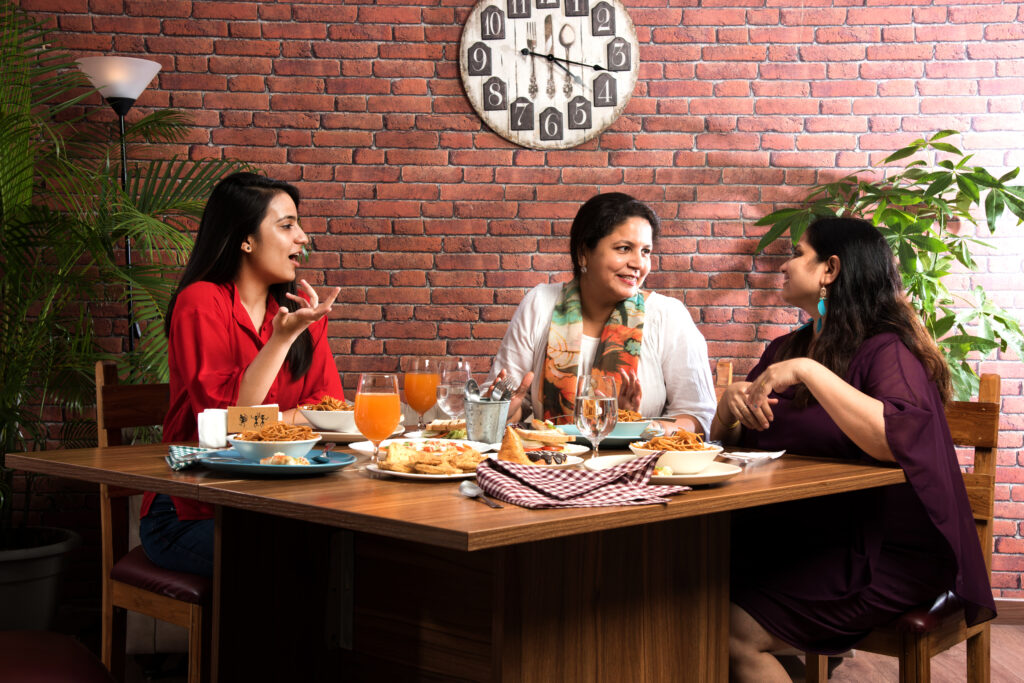Craving a plate of steaming Pad Thai or a juicy Paneer Burger during pregnancy? Don’t put those cravings on hold! With a little preparation and some smart choices, venturing out to your favourite restaurants can be a delightful and satisfying dining experience for both you and your growing baby.

Many women crave restaurant meals during pregnancy, but concerns about food safety can dampen those desires. The good news is that with a little planning and awareness, enjoying a night out doesn’t have to be risky. Here’s how to navigate restaurant menus and buffets while keeping you and your baby healthy.
Choosing the Right Restaurant
Look for Certifications: Opt for restaurants with certifications from local health authorities and good online reviews regarding cleanliness.
Freshness is Key: Order dishes made to order and served hot. Avoid buffets where food may have been sitting out for extended periods.
Making Savvy Menu Choices
Cooked Foods: Order dishes that are freshly cooked and served hot. Avoid raw or undercooked meats, seafood, and eggs, as they may contain harmful bacteria and parasites.
Fruits and Vegetables: Avoid pre-cut raw fruits and vegetables unless you wash and peel them yourself or you trust the restaurant’s hygiene standards. Opt for cooked vegetables instead.
Dairy Products: Ensure all dairy products, including milk, cheese, and yoghurt, are pasteurised. Unpasteurised products can carry harmful bacteria like Listeria.
Seafood: Avoid raw seafood like sushi and sashimi. Ensure all seafood is well-cooked to avoid bacterial contamination. Be cautious with shellfish as they are prone to toxins and bacteria.
Avoid Pre-Packaged Salads
Avoid pre-packaged salads from stores or buffets. They may have been sitting out for a long time and are more prone to bacterial contamination.
Avoid salads with unpasteurised cheese (such as feta, Brie, Camembert, and blue cheese) and dressings made with raw eggs or unpasteurised milk.
Avoid salads containing processed meats, such as deli meats, hot dogs, and smoked seafood, which can harbour Listeria.
Homemade Salads: Prefer salads made at home where you can control the washing and preparation process. If making dressings at home, use pasteurised eggs or avoid raw eggs altogether. Consider using vinegar or lemon juice-based dressings, which are safer options.
Temperature Control: Keep salads cold until ready to be eaten. If transporting salads, use ice packs or a cooler.

Water and Beverages
Water: Drink only bottled water with intact seals or boiled water.
Ice: Avoid ice in drinks, as it may be made from unfiltered water. Opt for beverages served without ice or ensure the ice is made from safe, filtered water.
Beverages: Avoid unpasteurised juices and beverages.
Handling Buffets
Freshness: Ensure buffet items are freshly prepared and not left out for extended periods. Hot items should be steaming, and cold items should be properly refrigerated.
Serving Utensils: Use the serving utensils provided and avoid cross-contamination between different dishes.

General Precautions
Hand Hygiene: Wash hands thoroughly with soap and water before eating. If soap and water are not available, use a hand sanitiser containing at least 60% alcohol.
Food Temperature: Consume food while it is still hot. Avoid food that has been left out at room temperature for more than two hours.
Street Food: Street food often lacks proper hygiene standards and poses a higher risk of contamination. When eating outside, avoid all raw foods or drinks (like pani puri water, jal jeera, sugarcane juice, sprouts, etc.). Also, avoid eating and drinking from roadside stalls.
Prefer to have your favourite chats made at home.
Leftovers at home
Avoid eating leftovers, especially if they have not been stored and reheated properly. Maintaining the right food temperature during pregnancy is crucial to preventing foodborne illnesses –
Hot Foods: hot foods at 60°C (140°F) or above to prevent bacterial growth.
Cold foods: Keep cold foods at 4°C (40°F) or below.
Ask About Food Preparation: When in doubt, ask restaurant staff about how food is prepared and stored.
Seek out restaurants that display certifications from local health authorities. This signifies their commitment to food safety protocols.
By following these simple yet effective tips, you can transform your next restaurant outing into a delightful and safe experience. Remember, a healthy and happy mom-to-be translates into a healthy and happy baby! So, go forth, explore new culinary delights, and embrace the joys of dining out during your pregnancy journey!
Dr Latha Sashi
Chief Nutritionist & Head,
Dept of Clinical Nutrition & Dietetics, Fernandez Hospital



